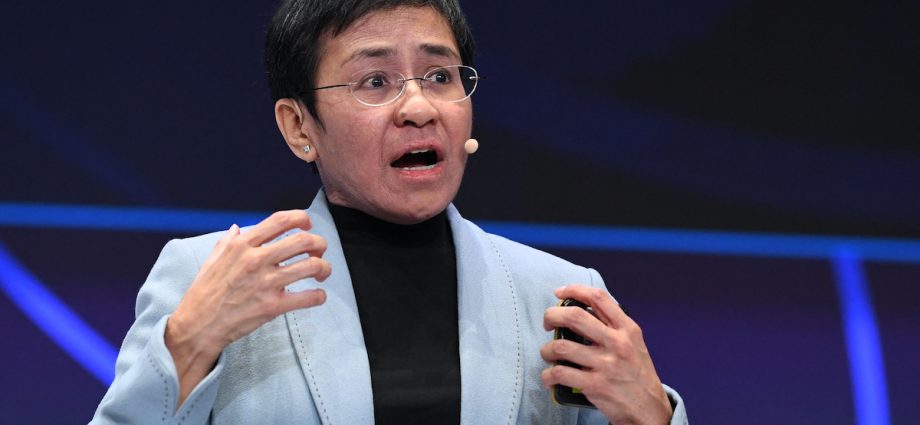
This week’s acquittal of Maria Ressa is the latest in a string of court decisions suggesting that the Philippine judicial system is starting to back human rights in defiance of the government.
This comes at a pivotal time, with President Ferdinand Marcos Jr accused of attacking press freedom and continuing the deadly drug war of his predecessor, Rodrigo Duterte.
The Philippine Court of Tax Appeals acquitted Ressa and her news outlet Rappler of tax evasion on Wednesday, in what is widely seen as a victory for press freedom in the Philippines.
The case was launched by the former Duterte government in 2018, accusing Ressa and Rappler of evading tax when it raised capital through foreign investors. Both strenuously denied the charges.
In making its decision, the court stated that the prosecutors had failed to prove Ressa’s and Rappler’s guilt beyond reasonable doubt and that neither had gained from any transactions.
Ressa, a prominent journalist and Nobel laureate, had been a strong critic of the Duterte government. Rappler had previously reported on the former government’s brutal war on drugs, which is estimated by human-rights groups to have killed tens of thousands of people. At the time, Duterte responded angrily to these allegations, calling Rappler a “fake news outlet.”
In an interview with the Britsh Broadcasting Corporation after Wednesday’s verdict, Ressa said “this is a day that we had hoped would happen sooner” and that the case “went down to these three things, facts, truth and justice. That is who won today.”
Her acquittal therefore marks an important moment for human rights in the Philippines.
The Philippine judicial system has been notorious for protecting government officials and police officers in response to corruption and extrajudicial killings. This is largely due to government pressure, including threats of harm on judges and lawyers.
But things appear to the changing, and the courts now appear to be finally backing human rights.
There are other examples of this chance in approach by the courts.
In November, a Caloocan City court handed down a rare conviction of a police officer, sentencing Jefrey Perez to two terms of life imprisonment for torture and planting evidence in response to the deaths of Carl Angelo Arnaiz, 19, and Reynaldo De Guzman, 14, in August 2017. Both Arnaiz and de Guzman were killed in an anti-drug police operation.
Perez is one of only three police officers convicted for killing a drug suspect since the drug war began in 2016.
In December, a Philippine court of appeals allowed a family to correct the death certificate of their nine-year-old son, killed in a drug-related shooting in Caloocan City in 2016.
A Reuters investigation has found several cases of shooting deaths being mislabeled as “pneumonia” or “hypertension,” with poor families pressured by the authorities to accept misleading death certificates before they can bury their loved ones.
Last month’s decision, the first of its kind, marks an important watershed. Justice has finally been granted to one of the families of those killed in anti-drug operations or by Duterte-supported vigilante groups.
But more needs to be done to protect human rights in the Philippines.
President Marcos continues to attack press freedom, with journalists warning that the government is taking a hard line against media critics. Last June, the government blocked more than 12 websites of media organizations, including Pinoy Weekly and Bulatlat.
More concerning is the shooting death of prominent journalist Percival Mabasa in Manila last year, which led to calls from the National Union of Journalists of the Philippines for better protection from the government.
The judicial system also remains under pressure. Late last year, the National Union of Peoples’ Lawyers claimed that the harassment of lawyers and judges has continued under Marcos. The Union also claimed that 59 lawyers were killed during the Duterte regime.
To ensure that human rights are respected in the Philippines, three things need to occur.
The government needs to respect press freedom and ensure the safety of journalists. Allowing legitimate criticism through independent media outlets, such as Rappler, Pinoy Weekly and Bulatlat, will allow journalists to do their job safely without fear of arrest or harm.
Threats against and killings of lawyers and judges also need to stop. The judicial system should remain independent of government and its lawyers and judges allowed to make decisions freely and safely based on Philippine law. A strong judicial system will go a long way in ensuring that the rights of Filipinos are protected.
Finally, there needs to be a thorough independent investigation into the war on drugs under the Duterte regime and a cessation of deadly anti-drug operations under the current government. This can be achieved by the government fully cooperating with the current International Criminal Court investigation. This way, the families of those killed can finally receive long-denied justice.
Filipinos have suffered through a brutal eight years of extrajudicial killings and attacks on press freedom. But recent court decisions, particularly that of Maria Ressa, offer hope that the judicial system has started to adequately protect human rights, even if the government will not.
While there is still work to do to ensure that the rights of Filipinos are protected, this is a welcome step toward a freer and safer Philippines.

